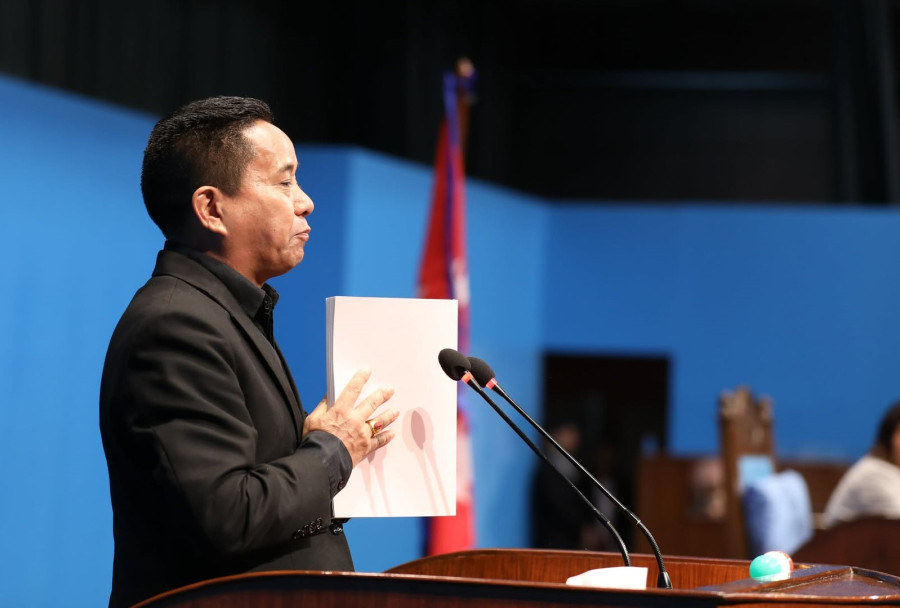National
Ruling lawmakers erupt in Parliament over ‘biased’ budget allocation
Congress and UML lawmakers accuse ministers of favouritism, demand budget revision.
Post Report
A storm of criticism broke out in the House of Representatives on Sunday as lawmakers from the ruling coalition lashed out at Deputy Prime Minister Prakash Man Singh, who leads Congress ministers in the Cabinet, and Deputy Prime Minister and Finance Minister Bishnu Paudel of the CPN-UML, accusing them of manipulating the national budget for narrow personal and political gains.
Congress lawmaker Purna Bahadur Tamang went as far as to publicly pray that neither Singh nor Paudel be re-elected in the next general elections.
“I pray before Lord Buddha and Pashupatinath that these two deputy prime ministers do not return to this House after the 2027 elections,” Tamang said from the House rostrum.
He accused the two ministers of allocating a disproportionate share of ministry budgets to their home districts—Singh to Kathmandu and Paudel to Rupandehi—while leaving other regions overlooked.
“They are in line to be the next prime minister, yet their allocation behaviour is narrow and regional,” Tamang said, threatening to raise the issue even at the upcoming Nepali Congress general convention that elects the party’s new leadership.
Congress lawmaker Sunil Sharma echoed the sentiment, lambasting ministers for treating the budget as a tool for political gains.
“You act as if only five districts exist in this country. What about the remaining 72?” he asked, highlighting the stark inequality in resource allocation despite citizens across all districts paying the same taxes.
Sharma also criticised the finance ministry’s ‘Take and Pay’ model in the energy sector, warning it would discourage domestic investment in hydropower development. He called Section 57 of the budget—which requires a 35 percent upfront tax on additional investment—“criminal” and demanded its immediate withdrawal.
Joining the dissenting voices, Surya Bahadur Thapa, a lawmaker from the prime minister’s party the CPN-UML, directly questioned Deputy Prime Minister Singh for allegedly naming budget titles after his father, the late Ganesh Man Singh. “Can a country be developed on the back of budget lines named after your father?” Thapa asked, calling the urban development ministry “chaotic and mismanaged”.
The House meeting at times turned tense as lawmakers, who were angry for ‘ignoring their constituencies’, vented their frustration while airing their views.
Independent MP Amresh Kumar Singh triggered outrage after controversially suggesting that it would be better for “the 72 unlucky districts” to be leased out to other countries if they are to be deprived of the budget funding. His comments were deemed “anti-national” and were expunged from the parliamentary records by Speaker Devraj Ghimire.
Senior Congress MP Arjun Narsingha KC criticised the prime minister’s decision to chair the newly formed Good Governance Commission.
He warned against rising arrogance within the ruling ranks and urged dialogue with opposition forces to restore parliamentary decorum.
Adding to the chorus of dissent, another Congress lawmaker Ramhari Khatiwada demanded that the government revise the budget following parliamentary discussions.
“There’s an outdated practice that no changes can be made after the budget is tabled in the House. That needs to change. We must heed lawmakers’ voices in the final budget,” he said.
Khatiwada, who chairs the State Affairs and Good Governance Committee of the lower house, called the pre-budget process as superficial.
“Had the budget been developed after prior discussion with lawmakers, ministers wouldn’t be facing this backlash. Let us start the practice of amending the budget,” he stated.
UML lawmaker Basudev Ghimire also voiced strong dissatisfaction, accusing ministers of using budget allocations as a ‘vote-buying strategy’ by favouring their constituencies while sidelining better projects proposed by other MPs.
“Budget spending alone doesn’t win elections. Past trends have already shown that,” he warned.
Ghimire criticised the government for treating MPs as mere cheerleaders in the budget process. “There is a tradition of extensive parliamentary deliberations, but in the end, the budget gets passed without a single change. This tradition must end,” he asserted.
Despite being part of the ruling coalition, Congress and UML lawmakers expressed their anger that the budget “lacks fairness, equity, and transparency”.
However, as the ruling parties issue whips asking their lawmakers to vote in favour of the budget, the lawmakers from the governing coalition will have no option other than to abide by the parties’ instruction.




 10.12°C Kathmandu
10.12°C Kathmandu














